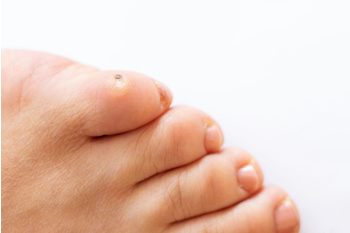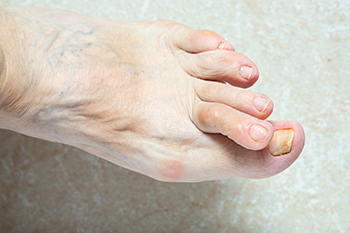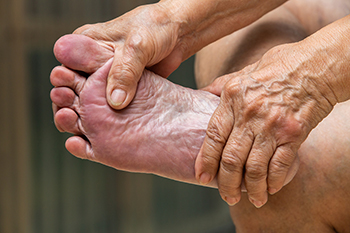
Corns are thickened areas of skin that develop due to repeated pressure or friction, commonly on the feet. There are three main types of corns. Hard corns appear as small, dense, and raised bumps often found on the tops or sides of toes. Soft corns are softer and rubbery, usually occurring between toes where moisture is present. Seed corns are tiny, clustered corns found on the soles of the feet. Symptoms include discomfort or pain when walking or wearing shoes, and the skin may feel rough, dry, or tender. Corns are caused by ill-fitting shoes, abnormal foot mechanics, or repetitive activities. A podiatrist can diagnose corns through examination and recommend treatments. Options include protective padding, shoe modifications, trimming or removal of the corn, and addressing underlying causes like foot deformities. It is suggested that you make an appointment with a podiatrist to relieve pain and prevent corns from worsening or recurring.
If you have any concerns regarding your feet and ankles, contact One of our podiatrists of Foot and Ankle Medical Center. Our doctors will treat your foot and ankle needs.
Corns: What Are They? and How Do You Get Rid of Them?
Corns can be described as areas of the skin that have thickened to the point of becoming painful or irritating. They are often layers and layers of the skin that have become dry and rough, and are normally smaller than calluses.
Ways to Prevent Corns
There are many ways to get rid of painful corns such as wearing:
- Well-fitting socks
- Comfortable shoes that are not tight around your foot
- Shoes that offer support
Treating Corns
Treatment of corns involves removing the dead skin that has built up in the specific area of the foot. Consult with Our doctors to determine the best treatment option for your case of corns.
If you have any questions, please feel free to contact our offices located in New Port Richey and Spring Hill, FL . We offer the newest diagnostic and treatment technologies for all your foot care needs.

Hammertoe is more than a visible deformity of the smaller toes. The bent position alters how the foot bears weight and shifts pressure across the lower extremity. As the toes contract, the forefoot absorbs greater force, changing walking patterns and placing extra stress on the plantar fascia, which is the band of tissue on the bottom of the foot. This strain can trigger heel pain or plantar fasciitis, which in turn may further disrupt normal gait. Over time, a cycle develops where abnormal mechanics worsen both the toe deformity and the surrounding soft tissue irritation. Muscle imbalance and tendon tightness may also contribute to ongoing damage, making correction more difficult as the condition progresses. Wearing supportive footwear, targeted stretching, and orthoses can help reduce stress on the toes and fascia, but advanced cases may require surgical correction. If you are experiencing painful changes linked to hammertoe, it is suggested that you consult a podiatrist for evaluation and appropriate treatment.
Hammertoes can be a painful condition to live with. For more information, contact One of our podiatrists of Foot and Ankle Medical Center. Our doctors will answer any of your foot- and ankle-related questions.
Hammertoe
Hammertoe is a foot deformity that occurs due to an imbalance in the muscles, tendons, or ligaments that normally hold the toe straight. It can be caused by the type of shoes you wear, your foot structure, trauma, and certain disease processes.
Symptoms
- Painful and/or difficult toe movement
- Swelling
- Joint stiffness
- Calluses/Corns
- Physical deformity
Risk Factors
- Age – The risk of hammertoe increases with age
- Sex – Women are more likely to have hammertoe compared to men
- Toe Length – You are more likely to develop hammertoe if your second toe is longer than your big toe
- Certain Diseases – Arthritis and diabetes may make you more likely to develop hammertoe
Treatment
If you have hammertoe, you should change into a more comfortable shoe that provides enough room for your toes. Exercises such as picking up marbles may strengthen and stretch your toe muscles. Nevertheless, it is important to seek assistance from a podiatrist in order to determine the severity of your hammertoe and see which treatment option will work best for you.
If you have any questions, please feel free to contact our offices located in New Port Richey and Spring Hill, FL . We offer the newest diagnostic and treatment technologies for all your foot care needs.

As people age, foot problems become more common and can affect mobility and quality of life. Arthritis leads to joint stiffness, swelling, and pain that limit movement. Bunions cause a bony bump on the side of the big toe, leading to discomfort and difficulty finding proper shoes. Plantar fasciitis results in sharp heel pain, especially with the first steps in the morning. Additionally, diabetic foot problems may include numbness, poor circulation, and wounds that heal slowly, increasing the risk of infection. A podiatrist can help by diagnosing these conditions, providing custom treatments, recommending supportive footwear, and preventing complications. If you are elderly and foot pain or changes in your feet are interfering with daily activities, it is suggested that you promptly consult a podiatrist who can guide you toward effective relief solutions.
Proper foot care is something many older adults forget to consider. If you have any concerns about your feet and ankles, contact One of our podiatrists from Foot and Ankle Medical Center. Our doctors can provide the care you need to keep you pain-free and on your feet.
The Elderly and Their Feet
As we age we start to notice many changes in our body, but the elder population may not notice them right away. Medical conditions may prevent the elderly to take notice of their foot health right away. Poor vision is a lead contributor to not taking action for the elderly.
Common Conditions
- Neuropathy – can reduce feeling in the feet and can hide many life-threatening medical conditions.
- Reduced flexibility – prevents the ability of proper toenail trimming, and foot cleaning. If left untreated, it may lead to further medical issues.
- Foot sores – amongst the older population can be serious before they are discovered. Some of the problematic conditions they may face are:
- Gouging toenails affecting nearby toe
- Shoes that don’t fit properly
- Pressure sores
- Loss of circulation in legs & feet
- Edema & swelling of feet and ankles
Susceptible Infections
Diabetes and poor circulation can cause general loss of sensitivity over the years, turning a simple cut into a serious issue.
If you have any questions, please feel free to contact our offices located in New Port Richey and Spring Hill, FL . We offer the newest diagnostic and treatment technologies for all your foot care needs.

